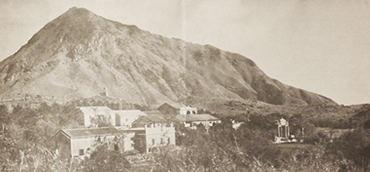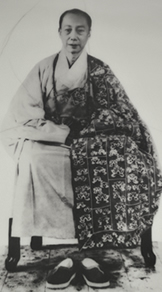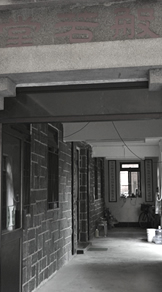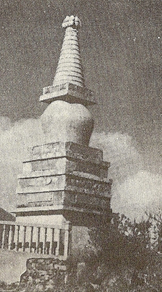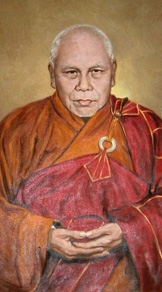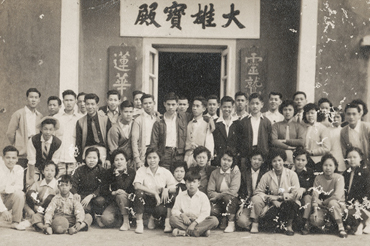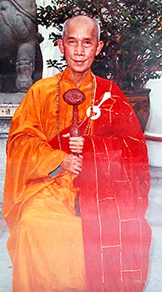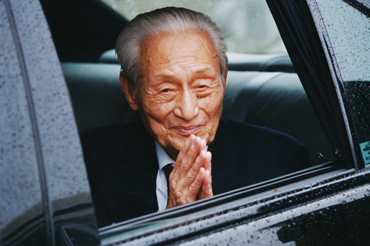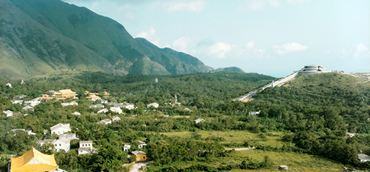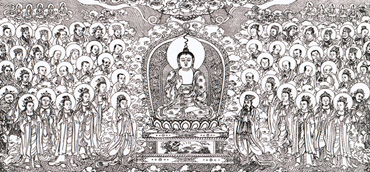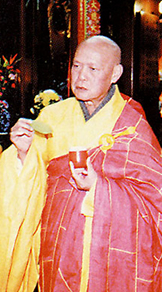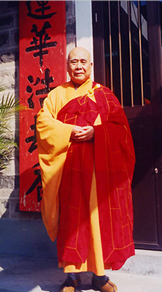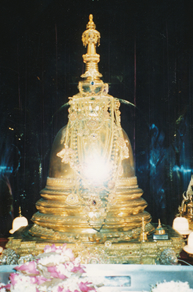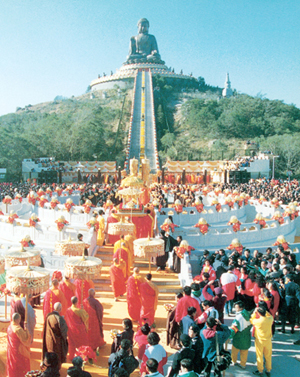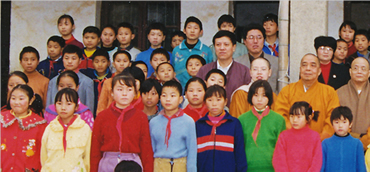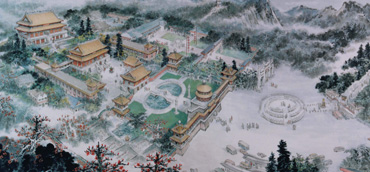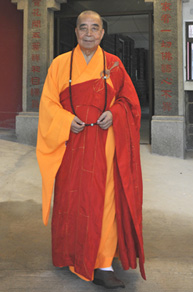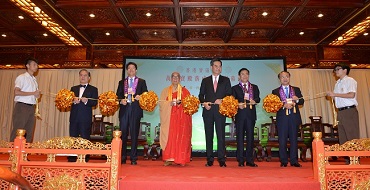
- 掃壹掃,關註微信公眾號


- 請使用微信掃描二維碼關註
- Homepage
- Po Lin in a Century
- A Brief History of the Monastery
Po Lin Monastery was known as the 'Big Thatched Hut' in the early days more than a century ago. In 1906, three Buddhist monks of the Ch'an School, Venerables Da Yue, Dun Xiu and Yue Ming traveled from Jiangsu Province of China to Lantau Island to set up a site for practice. Since then, many members of the Sangha from all directions were attracted to the place, marking the gradual rise of the Ch'an (Zen) School of Buddhism in Hong Kong. In 1924, the 'Big Thatched Hut' was renamed Po Lin Monastery and Venerable Ji Xiu became the first Abbot. Since then, Po Lin Monastery has developed into a world renowned monastery and is now led by the eighth Abbot, Venerable Jing Yin.
Venerables Da Yue, Dun Xiu and Yue Ming were from the Jiangtian Monastery at Jinshan, Zhenjiang prefecture of Jiangsu province. Arriving on Lantau Island, they were delighted to find an expansive flat land amidst the tranquil mountains. Though the place was over grown with thorn bushes and access to it was difficult, they found it a place of serenity ideal for religious practice and spreading Dharma.
To start with, they cleared the bushes and built a small stone house. Many monks were attracted by the tranquility and serenity of the place and more came and practiced over the years. They pulled together to built a big thatched hut and grew crops for food while diligently pursuing along the path of enlightenment. A primordial Buddhist discipline of the Ch'an School was thus established in Hong Kong.
Po Lin Monastery has always supported China's policy of "development through education". Since 1996, we have contributed towards the building of over 280 schools under Project Hope in Mainland China. Construction of the Grand Hall of Ten Thousand Buddhas commenced in November 2007 and is expected to be completed in 2012. It will house the Hall of Ten Thousand Buddhas, Scripture Library, Abbot's Chamber, Dharma Hall and a permanent Ordination Platform. When completed, this monumental building will be a central place for holding religious and cultural events. The new Grand Hall will have an exhibition venue of over 3,000 square meters for displaying ancient Chinese and precious Buddhist relics. The purpose of setting up the exhibition venue is to preserve relics of historical importance and to showcase Chinese and Buddhist cultural heritage locally and overseas.
Venerable Ji Xiu, also from the Jiangtian Monastery at Jinshan, occasioned upon Lantau Island on his tour of Buddhist study. At the earnest request of members of the monastic order, Venerable Ji Xiu assumed abbotship, renamed the 'Big Thatched Hut' to Po Lin Monastery and became the monastery's first Abbot. Venerables Da Yue, Dun Xiu and Yue Ming were revered as the monastery's founding teachers.
The first Autumn Ordination Ceremony was held, participated by dozens of lay followers.
The Hall of Great Perfection was built. To its left was the Vajra Cave for meditation and on the right was the Guest Hall and the Treasury. When the construction of the Hall of Great Perfection started, monks, nuns and laymen of small temples on the Lantau Island grouped together to help in the construction work, laying bricks and tiles, in a collective effort towards the good for all from ten directions.
After completing the Autumn Precept Ceremony, Abbot Ji Xiu retired from the abbotship. The Sangha selected Venerable Fat Ho as the second Abbot. Under the stewardship of Abbot Fat Ho, a number of halls were built, including the Hall of Bodhisattva Skanda, Hall of Bodhisattva Ksitigarbha, Ancestral Hall, Abbot's Chamber, Five Contemplations Dinning Hall, Pagoda of the Lotus Sutra, Pagoda of the Flower Ornament Sutra, Arhat Pagoda and Prajna Hall (the new Ch'an Hall).
Venerable Fat Ho, resuming abbotship, revamped the traditional administration mode of Po Lin Monastery and changed it to a system under the stewardship of a board of directors. Abbot Fat Ho was the first Board Chairman.
A decision was made to build the Big Buddha Statue and the Fat Ho Memorial Home for the Elderly.
Venerables Yuen Wai and Chi Wai led a delegation of over 20 monks to visit the Mainland. They were warmly welcomed by Mr. Zhao Pochu, President of the Buddhist Association of China and members of the Chinese Buddhist order. This visit was instrumental in establishing formal ties between the Buddhist communities in Hong Kong and the Mainland. To mark this milestone visit, the Buddhist Association of China presented a set of Qianlong Tripitaka (Chinese Buddhist Canon), to Po Lin Monastery. The Tripitaka consists of 7,173 volumes. The scriptures were wood block-printed in Qing Dynasty between 1735 AD and 1738 AD, being the last official version printed in China, a much treasured version.
Po Lin Monastery dispatched a delegation to Beijing to receive Qianlong Tripitaka. The presentation ceremony was led by Mr. Zhao Pochu, President of the Buddhist Association of China. In October, Venerable Ju Zan, Vice President of the Buddhist Association of China, led a delegation to escort the Qianlong Tripitaka to Hong Kong and the occasion was marked by a grand welcoming ceremony. A public exhibition of the scriptures was staged jointly by the Po Lin Monastery and the Buddhist Association of China.
Planning started for the construction of the Grand Hall of Ten Thousand Buddhas. The project is aimed at further establishing Po Lin Monastery as a centre for advancing Buddhism and a platform for promoting Chinese culture, sculptural art and landscape gardening. The Grand Hall of Ten Thousand Buddhas is scheduled for completion in 2013.
The opening ceremony of the Grand Hall of Ten Thousand Buddhas was held on 31 October 2014.
“The Symposium of ideology of Zhao Pochu” was jointly organized by Po Lin Monastery, Center for Chinese Cultural Research Institute of Nanjing University, Centre of Buddhist Studies,The University of Hong Kong and Centre for the Study of Humanistic Buddhism,CUHK from 31 October to 2 November 2014. The monks and the specialists from Mainland China and Hong Kong were invited to participate.
